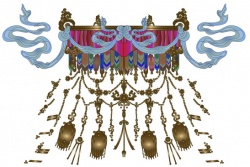Difference between revisions of "Mihirakula"
(Created page with "thumb|250px| <poem> Mihirakula 大族王 (n.d.) (Skt; Jpn Daizoku-o) A king of {{Wiki|ancient}} Cheka, also known as [[Takka]...") |
|||
| Line 6: | Line 6: | ||
A [[king]] of {{Wiki|ancient}} [[Cheka]], also known as [[Takka]], in [[India]]. According to The [[Record of the Western Regions]], [[Hsüan-tsang's]] record of his travels through {{Wiki|Central Asia}} and [[India]] in the seventh century, he was a brave and {{Wiki|intelligent}} [[ruler]] who extended his domain to include the neighboring {{Wiki|kingdoms}}. He originally [[desired]] to study [[Buddhism]] and commanded that a learned and [[virtuous]] [[monk]] be recommended to him. The [[monks]] of those days were [[humble]] and did not aspire to high honors, so none came forward in response to the king's request. Eventually his ministers found a man of outstanding [[virtue]] who had served as a menial in the king's household before becoming a [[monk]]. | A [[king]] of {{Wiki|ancient}} [[Cheka]], also known as [[Takka]], in [[India]]. According to The [[Record of the Western Regions]], [[Hsüan-tsang's]] record of his travels through {{Wiki|Central Asia}} and [[India]] in the seventh century, he was a brave and {{Wiki|intelligent}} [[ruler]] who extended his domain to include the neighboring {{Wiki|kingdoms}}. He originally [[desired]] to study [[Buddhism]] and commanded that a learned and [[virtuous]] [[monk]] be recommended to him. The [[monks]] of those days were [[humble]] and did not aspire to high honors, so none came forward in response to the king's request. Eventually his ministers found a man of outstanding [[virtue]] who had served as a menial in the king's household before becoming a [[monk]]. | ||
| − | On {{Wiki|learning}} that the [[monk]] sent to instruct him had formerly been his servant, the [[king]] lost his reverence for [[Buddhism]] and instead turned against it, banishing the [[Buddhist]] [[monks]] from the {{Wiki|kingdom}}. He later attempted to conquer [[Magadha]], but was instead captured by its [[king]], [[Baladitya]], who was a [[Buddhist]]. [[Baladitya]] was about to have him killed, but [[Baladitya's]] mother interceded, entreating her son to be [[merciful]], and saved him. [[Mihirakula]] then fled to [[Kashmir]] where he was warmly received, but later he fomented a rebellion and killed the [[king]], assuming power himself. He went on to attack [[Gandhara]] where he had the {{Wiki|royal}} family and ministers put to [[death]]. He destroyed [[Buddhist temples and stupas]] and killed more than half of the [[people]] on account of their [[Buddhist]] [[faith]]. [[Mihirakula]] [[died]] that same year, however, and he was said to have fallen into the [[hell]] of {{Wiki|incessant}} [[suffering]]. | + | On {{Wiki|learning}} that the [[monk]] sent to instruct him had formerly been his servant, the [[king]] lost his reverence for [[Buddhism]] and instead turned against it, banishing the [[Buddhist]] [[monks]] from the {{Wiki|kingdom}}. He later attempted to conquer [[Magadha]], but was instead captured by its [[king]], [[Baladitya]], who was a [[Buddhist]]. [[Baladitya]] was about to have him killed, but [[Baladitya's]] mother interceded, entreating her son to be [[merciful]], and saved him. [[Mihirakula]] then fled to [[Kashmir]] where he was warmly received, but later he fomented a rebellion and killed the [[king]], assuming power himself. He went on to attack [[Gandhara]] where he had the {{Wiki|royal}} family and ministers put to [[death]]. He destroyed [[Buddhist]] [[temples]] and [[stupas]] and killed more than half of the [[people]] on account of their [[Buddhist]] [[faith]]. [[Mihirakula]] [[died]] that same year, however, and he was said to have fallen into the [[hell]] of {{Wiki|incessant}} [[suffering]]. |
</poem> | </poem> | ||
{{R}} | {{R}} | ||
[http://www.sgilibrary.org/search_dict.php?SearchSelect=dict&p=2&m=1&in=2&q=hell www.sgilibrary.org] | [http://www.sgilibrary.org/search_dict.php?SearchSelect=dict&p=2&m=1&in=2&q=hell www.sgilibrary.org] | ||
[[Category:History of Buddhism]] | [[Category:History of Buddhism]] | ||
Latest revision as of 20:32, 24 January 2014
Mihirakula
大族王 (n.d.) (Skt; Jpn Daizoku-o)
A king of ancient Cheka, also known as Takka, in India. According to The Record of the Western Regions, Hsüan-tsang's record of his travels through Central Asia and India in the seventh century, he was a brave and intelligent ruler who extended his domain to include the neighboring kingdoms. He originally desired to study Buddhism and commanded that a learned and virtuous monk be recommended to him. The monks of those days were humble and did not aspire to high honors, so none came forward in response to the king's request. Eventually his ministers found a man of outstanding virtue who had served as a menial in the king's household before becoming a monk.
On learning that the monk sent to instruct him had formerly been his servant, the king lost his reverence for Buddhism and instead turned against it, banishing the Buddhist monks from the kingdom. He later attempted to conquer Magadha, but was instead captured by its king, Baladitya, who was a Buddhist. Baladitya was about to have him killed, but Baladitya's mother interceded, entreating her son to be merciful, and saved him. Mihirakula then fled to Kashmir where he was warmly received, but later he fomented a rebellion and killed the king, assuming power himself. He went on to attack Gandhara where he had the royal family and ministers put to death. He destroyed Buddhist temples and stupas and killed more than half of the people on account of their Buddhist faith. Mihirakula died that same year, however, and he was said to have fallen into the hell of incessant suffering.
